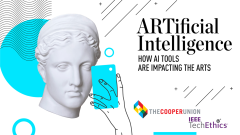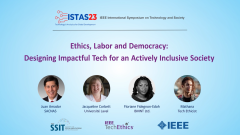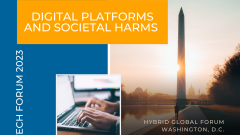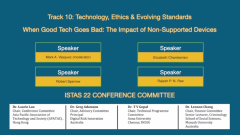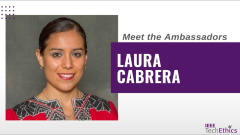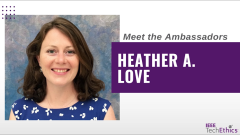4 + 1: The Impacts of Academia, Economics, Government and Civil Society on Sustainable Development
About the Video: This IEEE TechEthics session identifies ways in which interactions between the education system, the economic system, governments and the public contribute to the advancement of a sustainable global environment.
About the Panelists:
- Dr. Sara Belligoni is a Postdoctoral Research Associate at the Rutgers University's Department of Human Ecology and affiliated with the Rutgers-led Megalopolitan Coastal Transformation Hub (MACH). At MACH, she works with the Human Systems Dynamics team as a researcher and project manager to investigate the decision-making process towards mobility and migration of households in underserved communities of coastal New Jersey, New York City, and the Philadelphia metropolitan area when experiencing climate-related extreme weather events. She is a disaster scientist and expert in climate adaptation and mitigation policy, institutional and community-based crisis and emergency management, environmental and energy security in vulnerable coastal communities. Dr. Belligoni has experience conducting research taking a community engagement approach using a variety of methodologies of analysis such as metadata collection, interviews, focus groups, and geospatial analysis. She is an active public speaker, with over 30 published policy commentaries among other publications, and she has a well-established career in the academic, corporate, and not-for profit sectors as an analyst, business developer, data analyst, project manager, and researcher.
- Kelly Bohrer is the Director of Community Relations for the University of Dayton’s School of Engineering and is the Executive Director of the Ethos Center, which catalyzes and leverages partnerships with social change organizations to advance community engaged engineering education, research, and action. Incorporating over twenty years of experience working in and with higher education, community organizations, and metroparks, she creates opportunities for connecting global and local communities with higher education to co-create knowledge, leverage assets, and catalyze collaborations for collective impact. Kelly also designs experiences for students to engage their engineering mindset and skill set with community-driven projects to advance resilient and regenerative communities and form globally aware and culturally sensitive engineers. As a sustainability and social justice educator, community engaged learning specialist, and a community/university boundary spanner, she has developed and implemented several community-based global learning programs for educating future generations of justice-oriented citizens. Most recently, she has worked extensively with human rights colleagues and engineering faculty to establish the first ever Human Rights in Engineering minor and to grow the field of engineering for human rights. Kelly’s current scholarly activities include assessment of student learning through immersion programs, ethical engagement in engineering education, and links between vocational development and cross-cultural experiences.
- Britt Redd is a certified urban planner who is dedicated to ensuring neighbors have power over the places they value and the decisions that affect them. Britt has over 10 years of experience collaborating with neighbors on regional and neighborhood plans, public space designs, and economic development strategies. As the Principal Planner for Land Use Strategy at the City of Indianapolis Department of Metropolitan Development, Britt is the department’s point person for land use plans and policies. Britt was recently awarded the Indiana Humanities’ Wilma Gibbs Moore Fellowship, which supports racial justice research. Britt’s environmental justice project combines empirical data and interviews with Black residents who have lived in the city's most polluted areas. Britt holds a Master of Urban and Regional Planning and a Social and Environmental Justice Certificate from Ball State University College of Architecture and Planning.
- Dr. Carson Reeling is an environmental economist whose research focuses on wildlife management, nonmarket valuation, and the design of voluntary environmental policies for water quality and agricultural carbon sequestration. He holds degrees in from Michigan State University, Purdue University, and the University of San Diego. He is originally from California and enjoys carpentry, hunting, kayaking, and camping with his family.
- Mark A. Vasquez (moderator) is a Certified Association Executive (CAE) with over 30 years of experience in association management at IEEE. He currently serves as the senior program manager for IEEE TechEthics, a program that drives conversations about the ethical and societal impacts of technology. In this capacity, he works to develop relationships with others in the technology ethics community, produces events, convenes thought leaders, and more. Mark is an engineering graduate of The Cooper Union.
Recorded on 20 May 2023 at IEEE ETHICS-2023 (https://attend.ieee.org/ethics-2023/).
Produced in partnership with the IEEE Society on Social Implications of Technology (https://technologyandsociety.org/).
About the Video: This IEEE TechEthics session identifies ways in which interactions between the education system, the economic system, governments and the public contribute to the advancement of a sustainable global environment.
 Cart
Cart Create Account
Create Account Sign In
Sign In

